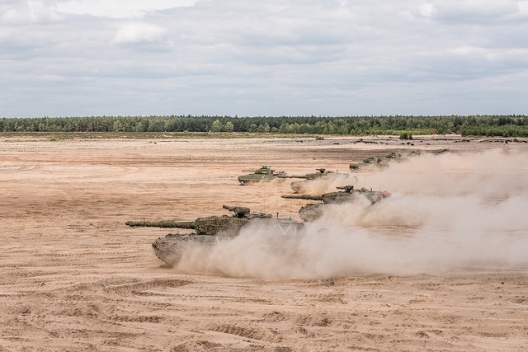 NATO currently has few forces in the Baltics, and Estonia, Latvia, and Lithuania have very limited militaries of their own. In the face of a Russian attack, they would be nearly defenseless. Russian forces could likely capture the Baltic capitals within days of crossing the Russian border, before NATO reinforcements could deploy in sufficient numbers to stop them….
NATO currently has few forces in the Baltics, and Estonia, Latvia, and Lithuania have very limited militaries of their own. In the face of a Russian attack, they would be nearly defenseless. Russian forces could likely capture the Baltic capitals within days of crossing the Russian border, before NATO reinforcements could deploy in sufficient numbers to stop them….
In an all-out conventional war, NATO far outclasses Russia and would likely prevail. Nevertheless, ejecting Russian troops from the Baltics would take many months, cost thousands of lives, and debilitate the European economy. And because Moscow’s strategic doctrine allows for the first use of nuclear weapons in the event of a threat to its vital interests, even a medium-sized conventional war would run the risk of escalation to nuclear conflict. Avoiding such a scenario—and the extremely painful choices it would impose on Europe and the United States—is clearly in everyone’s interests….
Over time, therefore, the United States may choose to increase the amount of equipment it pre-positions in the region, doubling or even tripling what was announced last week. A further step would be to permanently deploy forces into these countries. For example, NATO could deploy an armored brigade to each of the Baltic capitals, complemented by strengthened tactical air power in the region and bolstered command-and-control infrastructure and staff. NATO could also strengthen the Baltic nations’ own abilities to hamper the progress of adversary forces through unconventional warfare, including guerilla tactics. Finally, NATO could consider transitioning from existing Baltic Air Policing operations to a larger integrated air and missile defense system for the region. NATO efforts to strengthen regional defenses against unconventional or hybrid strategies of the kind deployed in Crimea and eastern Ukraine are already underway.
Opponents of the U.S. deployments will argue that last week’s announcements are evidence of chronic U.S. aggression and are undesirable because they could exacerbate tensions with Russia. Objections to further measures, especially permanent deployments, would be even more strident. But these objections are misplaced. Over the medium and long term, such reinforcements will reduce the chance of miscalculation by Moscow and, hence, of war. They also reduce a point of leverage that Moscow might seek to use against NATO during a crisis elsewhere. Although Russian leaders may cry foul at the idea of U.S. forces moving closer to their borders, moreover, they should be reminded that Moscow regularly deploys troops along the borders of the Baltic states. Although the announcements of the past week are bound to raise controversy, they are a positive step in addressing a major new challenge to European security.
Christopher S. Chivvis is Associate Director of the International Security and Defense Policy Center at the RAND Corporation and Adjunct Professor at the Johns Hopkins School of Advanced International Studies (SAIS).
Image: Norwegian armor participating in NATO Noble Jump Exercise, June 16, 2015 (photo: Erik Morren/German/Netherlands Corps)
